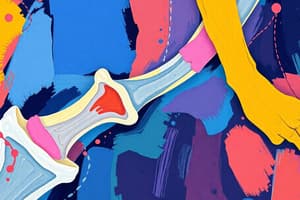Podcast
Questions and Answers
What is a characteristic cause of hypokalemia?
What is a characteristic cause of hypokalemia?
- Excessive potassium intake
- Medications that inhibit aldosterone
- Prolonged vomiting (correct)
- Renal failure
Which treatment is considered priority for a patient exhibiting symptoms of hyperkalemia?
Which treatment is considered priority for a patient exhibiting symptoms of hyperkalemia?
- Administering a potassium-sparing diuretic
- Infusion of calcium gluconate (correct)
- Initiating dialysis immediately
- Increasing dietary potassium intake
Which laboratory finding is typically associated with chronic kidney disease (CKD)?
Which laboratory finding is typically associated with chronic kidney disease (CKD)?
- Decreased BUN levels
- Increased serum creatinine (correct)
- Normal electrolyte levels
- Decreased urine output
Which statement accurately describes upper GI bleeding?
Which statement accurately describes upper GI bleeding?
What is a key characteristic of Crohn's disease compared to ulcerative colitis?
What is a key characteristic of Crohn's disease compared to ulcerative colitis?
Which of the following types of fractures can lead to significant complications, such as compartment syndrome?
Which of the following types of fractures can lead to significant complications, such as compartment syndrome?
What is a common sign or symptom of osteoporosis that differs from other bone disorders?
What is a common sign or symptom of osteoporosis that differs from other bone disorders?
Which of the following is NOT typically associated with osteomyelitis?
Which of the following is NOT typically associated with osteomyelitis?
In managing a patient with compartment syndrome, which of the following interventions is essential?
In managing a patient with compartment syndrome, which of the following interventions is essential?
Which statement about DVT is accurate?
Which statement about DVT is accurate?
What is a key nursing consideration when administering parenteral nutrition?
What is a key nursing consideration when administering parenteral nutrition?
Which of the following best describes refeeding syndrome?
Which of the following best describes refeeding syndrome?
What is a commonly recognized factor that impedes sleep hygiene?
What is a commonly recognized factor that impedes sleep hygiene?
Flashcards
Hypo/Hyper/Isotonic IV Fluids
Hypo/Hyper/Isotonic IV Fluids
Different types of intravenous fluids used to treat fluid imbalances, categorized by their effect on cell volume.
Fluid Deficit Causes
Fluid Deficit Causes
Conditions that lead to a loss of body fluid, including dehydration, vomiting, diarrhea, and excessive sweating.
Acute Kidney Injury (AKI) Causes
Acute Kidney Injury (AKI) Causes
Conditions that damage the kidneys and impair their function, resulting in decreased urine output, different from Chronic Kidney Disease (CKD).
Chronic Kidney Disease (CKD) Stages
Chronic Kidney Disease (CKD) Stages
Signup and view all the flashcards
Lower GI vs Upper GI Bleed Assessment
Lower GI vs Upper GI Bleed Assessment
Signup and view all the flashcards
Types of fractures
Types of fractures
Signup and view all the flashcards
Osteoporosis
Osteoporosis
Signup and view all the flashcards
Osteomyelitis
Osteomyelitis
Signup and view all the flashcards
Compartment syndrome
Compartment syndrome
Signup and view all the flashcards
DVT (Deep Vein Thrombosis)
DVT (Deep Vein Thrombosis)
Signup and view all the flashcards
Parenteral vs Enteral feeding
Parenteral vs Enteral feeding
Signup and view all the flashcards
Refeeding syndrome
Refeeding syndrome
Signup and view all the flashcards
Sleep apnea
Sleep apnea
Signup and view all the flashcards
Study Notes
Bone Disorders
- Types of fractures (matching)
- Osteoporosis
- Osteomyelitis
- Gout
- Compartment Syndrome
- Deep vein thrombosis (DVT)
- Rhabdomyolysis
- Case study on post-op ORIF patient with one-sided lower extremity pain and swelling. Includes questions on potential complications, nursing interventions, and SBAR reporting.
Perioperative Care
- Patient education (pre-op, post-op, and discharge) including smoking cessation, concerning pre-operative symptoms, and discharge instructions.
- Prevention and management of common post-operative complications (e.g., pneumonia, DVTs).
- Use of IV and oral medications in pain management.
- Informed consent procedures.
Sleep
- Sleep apnea (signs, symptoms, treatments, CPAP, and non-CPAP interventions).
- Sleep deprivation (signs and symptoms).
- Sleep hygiene (best practices).
- Bonus question: HR changes in age/fitness levels.
Nutrition
- Nursing considerations for patients on parenteral and enteral feedings (patient safety concerns, PPN vs. TPN vs. tube feeds).
- Metabolic syndrome factors.
- Lab values, diagnostic studies (fasting glucose, vital signs).
- Labs linked to nutritional status, including signs/symptoms of low albumin levels.
Skin
- Refeeding syndrome
- Sunscreen guidance and recommendations.
- Wound healing (smoking impacts).
- Role of skin in general health.
- Signs/symptoms of atopic dermatitis.
Fluid and Electrolytes
- Differences between hypo, hyper, and isotonic fluids.
- Types of IV fluids (refer to Electrolyte Quick Reference Guide).
- Clinical manifestations and causes of hypo/hyper (refer to Electrolyte Quick Reference Guide).
- Treatment for hyperkalemia.
- Causes of fluid deficit and excess (fluid imbalance study guide reference).
- Deficit - loss of fluid.
Renal
- Labs that link to kidney function and expected lab findings in CKD.
- Causes of types of Acute Kidney Injury (AKI).
- Clinical manifestations of each phase of AKI.
- Stages of Chronic Kidney Disease (CKD).
- Causes of uric acid kidney stones.
- Medications for chronic kidney disease (reference PowerPoint).
- Contraindications for medications.
- Assessment data prior to med administration (lab results/physical assessment).
GU
- Incontinence (difference in types, treatments, and nursing considerations).
- Nursing interventions for incontinence.
GI
- Lower vs upper GI bleeds: assessment findings with fluid volume deficit (select all that apply).
- Priority intervention in a patient with a new GI bleed.
- Crohn's disease, ulcerative colitis, fistulas.
- GI bleed
- GERD: medications/treatments (H2 blockers and PPIs).
- Peritonitis (treatments including prioritization).
- Peptic ulcer disease (medications to avoid, risk factors, and causes).
- Case study applying ADPIE to a patient with abdominal pain. Questions include what GI problem is suspected, and which lab value is expected to be elevated.
Studying That Suits You
Use AI to generate personalized quizzes and flashcards to suit your learning preferences.




